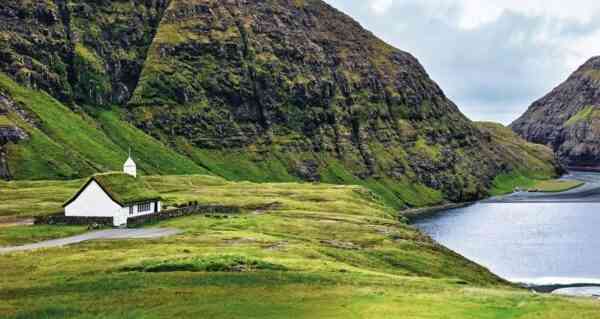The amazingly interesting nature of the Faroe Islands, which are part of Denmark, attracts curious and not afraid of a long journey tourists. In fact, they represent an independent country, although from a geopolitical point of view this is not so. The people living here are noticeably different in their habits and customs from the inhabitants of the mainland, and the local culture is truly unique.
Facts about the Faroe Islands
- The Faroese language here has an official status on a par with Danish.
- Despite the fact that the Faroe Islands are part of Denmark, since the middle of the last century they have de facto been almost an independent country (interesting facts about Denmark).
- The roofs of most houses in the Faroe Islands are green, and the houses themselves are painted in bright colors. This adds color to life and makes cities beautiful, which is very important, given that nature here is harsh and poor, although beautiful.
- The first inhabitants of the islands were the Scots and Irish, around the 8th century, but soon they abandoned them because of the raids of the Norwegian Vikings. Modern Faroese are mainly descendants of Scandinavians.
- The city of Tórshavn has been the capital of the Faroe Islands continuously since 850 AD. It is home to 13 thousand people, which is almost 30% of the country’s population.
- About 28,600 times more people live in China than in all the Faroe Islands. (interesting facts about China).
- The official currency here is the Danish krone, but with its own design.
- Faroese make up about 90% of the population of the islands.
- The most widely spoken foreign languages in the Faroe Islands are Norwegian, English and Danish.
- From 1940 to 1945, the Faroe Islands were occupied by Great Britain, who sought to prevent the Germans from taking possession of them.
- The roofs of some houses on the islands are covered with turf with grass growing on it. In Iceland, by the way, they do the same. It is both beautiful and helps to keep warm.
- Despite the fact that there are less than 50 thousand people living in all the Faroe Islands, as many as 77 nationalities are represented here.
- There are only 3 in all the Faroe Islands traffic light. They are all located in the capital, Tórshavn.
- Crime is almost non-existent here. There are no prisons here! Not one at all. And in those rare cases when a crime occurs, the caught criminals are sent to Denmark.
- There is not a single McDonald’s» in the Faroe Islands.
- They are washed by the warm current of the Gulf Stream, so the water near the coast has a temperature of about +10 degrees all year round.
- Rain and snow are very frequent here. Precipitation in the Faroe Islands falls on about 280 days a year, that is, 9.5 months out of 12 each year.
- Local farmers put reflectors on sheep’s legs to prevent them from being hit by a car in the dark.
- Free buses run around the capital of the Faroe Islands. But there are also paid routes.
- The islands are of volcanic origin. They formed about 30 million years ago.
- The Streymin Bridge connecting the two islands of the Faroe archipelago is the only bridge in the Atlantic Ocean.
- Despite the location near the Arctic Circle, it is relatively not cold here. But in summer the average temperature is only 7 degrees higher than in winter – +10 degrees and +3, respectively.
- According to the popular National Geographic magazine, the Faroe Islands are the friendliest island community in the world.
- The weather here often changes 10-20 times a day, the sun is replaced by rain and fog.
- For a long time alcohol in the Faroe Islands was completely banned. Prohibition has long been abolished, but alcohol is still exorbitantly expensive here.
- The basis of the income of the islands is fishing and tourism. About 97% of all goods exported from here are fish and seafood.
- Most Faroe Islanders do not use door keys and do not lock doors, as there is no theft.
- In science classes in In local schools, children also learn how to slaughter and butcher sheep properly.
- A sheep’s head is a popular food among the Faroese. Frozen heads are sold in most supermarkets.
- The Faroe Islands banned the sale of alcohol shortly after local women won the right to vote.
